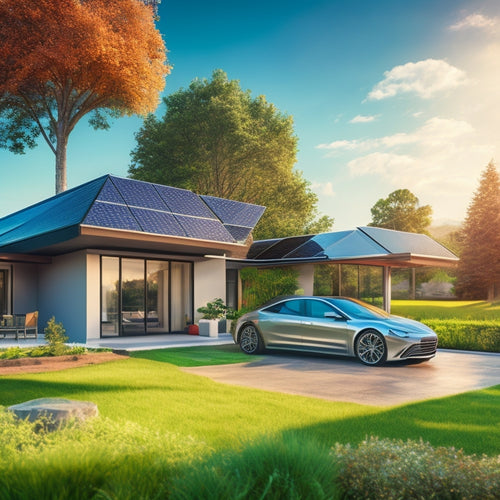
What Are the Most Cost-Effective Solar Energy Systems
Share
You want a solar energy system that provides the best value for your money. To achieve this, consider high-efficiency solar panels from reputable brands like SunPower, Panasonic, and LG Solar, which guarantee maximum energy production. Next, evaluate inverter options such as string inverters, microinverters, and power optimizers to maximize energy yield. Then, choose a suitable mounting system, whether ground-mounted or roof-mounted, and select a battery storage solution that suits your needs, like lead-acid, lithium-ion, or saltwater batteries. By making informed decisions at each stage, you can optimize your system's performance and reduce costs - and exploring these factors further will help you make the most of your investment.
Key Takeaways
- Opt for high-efficiency solar panels from reputable brands like SunPower, Panasonic, and LG Solar to maximize energy production.
- Select the right inverter type (string, microinverter, or power optimizer) to minimize energy losses and enhance system performance.
- Choose a durable and corrosion-resistant mounting system (ground or roof mount) that suits your installation needs.
- Consider battery storage solutions with high depth of discharge, round-trip efficiency, and cycle life to optimize energy storage.
- Take advantage of financing options, government-backed loans, and tax credits to reduce overall installation costs, which average $2.50 to $3.50 per watt.
Top Solar Panel Brands
As you examine the market for cost-effective solar energy systems, identifying top solar panel brands becomes an essential step in ensuring a reliable and efficient installation.
You'll want to focus on brands with a strong reputation, as they typically offer high-quality products and reliable warranties. Look for brands with a proven track record of producing efficient solar panels, as measured by their efficiency ratings. These ratings, usually expressed as a percentage, indicate how well a panel converts sunlight into electricity. Top brands typically boast efficiency ratings above 20%.
When evaluating brand reputation, consider factors such as durability, customer support, and certifications. Leading brands like SunPower, Panasonic, and LG Solar offer industry-leading efficiency ratings and solid warranties.
You'll also want to investigate brands that invest in research and development, as they're more likely to stay ahead of the curve regarding technology and innovation. By choosing a top solar panel brand, you'll be able to maximize your energy output while minimizing your costs.
Inverter Options for Savings
You've selected a top-tier solar panel brand, now it's time to optimize your system's performance with the right inverter. The inverter is responsible for converting DC power from your panels into AC power for your home. With so many options available, choosing the right one can be overwhelming.
Here are three key inverter options to evaluate for maximum savings:
-
String Inverters: Cost-effective and widely used, string inverters are a popular choice. They're ideal for systems with minimal shading issues, but can be less efficient if shading is a concern.
-
Microinverters: These inverters are installed under each panel, providing maximum flexibility and efficiency, even in shaded conditions. While more expensive upfront, microinverters can increase energy production and extend system lifespan.
-
Power Optimizers: A hybrid approach, power optimizers combine the benefits of string and microinverters. They're installed under each panel, but also allow for string inverter functionality, offering a balance between cost and performance.
When selecting an inverter, evaluate factors such as inverter efficiency, warranties, and hybrid capabilities.
Mounting Systems Matter
Your solar panels are now equipped with a high-performance inverter, but it's time to secure them in place with a reliable mounting system. This is a critical component of your solar energy setup, as it directly impacts the system's overall performance, longevity, and appearance.
You've got two primary options for mounting systems: ground mounts and roof mounts. Ground mounts offer more flexibility regarding panel orientation and are ideal for larger installations, while roof mounts are more suitable for residential applications.
When selecting a mounting system, consider the installation materials' durability factors, such as corrosion resistance and weatherability. Aesthetics also play a role, as the mounting system can affect the visual appeal of your solar array.
Tracking systems, which adjust the panel angle to optimize energy production, can be integrated into your mounting system for increased efficiency. By choosing the right mounting system, you'll guarantee your solar panels operate at peak performance, providing you with reliable, clean energy for years to come.
Battery Storage Solutions
Now that your solar panels are securely mounted, it's time to contemplate how to store the excess energy they produce. This is where battery storage solutions come in. You'll want to choose a system that optimizes energy efficiency and aligns with your power needs.
When selecting a solar battery, consider the following key factors:
-
Depth of Discharge (DOD): A higher DOD means more usable energy storage capacity.
-
Round-Trip Efficiency: Look for batteries with high efficiency rates to minimize energy losses during charging and discharging.
-
Cycle Life: A longer cycle life guarantees your battery will last longer and require fewer replacements.
There are various solar battery types to choose from, including lead-acid, lithium-ion, and saltwater batteries. Each has its unique advantages and disadvantages.
Installation Costs and Incentives
Optimism about the potential of solar energy often gives way to concerns about the upfront costs of installation. However, you'll be pleased to know that the cost of solar installation has decreased considerably over the years, making it more accessible to homeowners and businesses alike.
When assessing installation costs, you should factor in the cost of the solar panels, inverters, mounting hardware, and labor. On average, the total cost of installation ranges from $2.50 to $3.50 per watt, depending on the system size and quality. For a typical residential solar system, the total cost can range from $15,000 to $25,000.
Fortunately, there are various financing options available to help offset the upfront costs. You can investigate government-backed loans, power purchase agreements, or leasing options that allow you to pay a fixed monthly fee for the use of the solar system.
Additionally, you may be eligible for tax credits and rebates, which can considerably reduce your overall expenditure. It's also essential to assess the long-term maintenance costs, which are typically minimal, as solar panels require minimal upkeep and can last up to 30 years or more.
Frequently Asked Questions
Can I Install Solar Panels on a Metal Roof?
You're likely to be among the 83% of homeowners who'll increase their property value with solar panels! You can install solar panels on a metal roof, leveraging installation benefits like ease of mounting and metal roof advantages like durability and resistance to corrosion.
Do Solar Panels Work During a Power Outage?
You'll be relieved to know that, yes, solar panels can work during a power outage, but only if you have a battery backup system, ensuring continued energy supply; otherwise, your solar panel efficiency is wasted without power outage solutions like grid-tie inverters.
Are Solar Panels Resistant to Hail Damage?
You're wondering if solar panels can withstand hail damage. The good news is that most panels are designed to resist hail impact, with a solar durability rating of up to 1 inch (25mm) hailstones at 50mph (80km/h), ensuring your power generation remains uninterrupted.
Can I Add Solar Panels to an Existing System?
Like upgrading a high-performance engine, you can enhance your existing solar setup by adding new panels, but first, verify system expansion is possible and new panels are compatible with your current setup, avoiding a mismatch that could short-circuit your energy goals.
Do Solar Panels Require Regular Maintenance?
You'll need to clean your solar panels regularly to guarantee ideal energy production; typically, cleaning every 6-12 months is sufficient, but maintenance frequency may vary depending on your location and environmental factors.
Related Posts
-

What Solar Panels Work Best With EVS Online?
When shopping for solar panels online to power your electric vehicle, look for high-efficiency models that can withst...
-

5 Ways Bike Sharing Boosts Urban Sustainability
As you explore bike-sharing options, you'll discover five ways it boosts urban sustainability. By reducing congestion...
-

10 Best Ways to Purify Urban Air With EVS
You're looking for ways to purify urban air with Electric Vehicles (EVs). You can start by incorporating EVS Air Filt...


